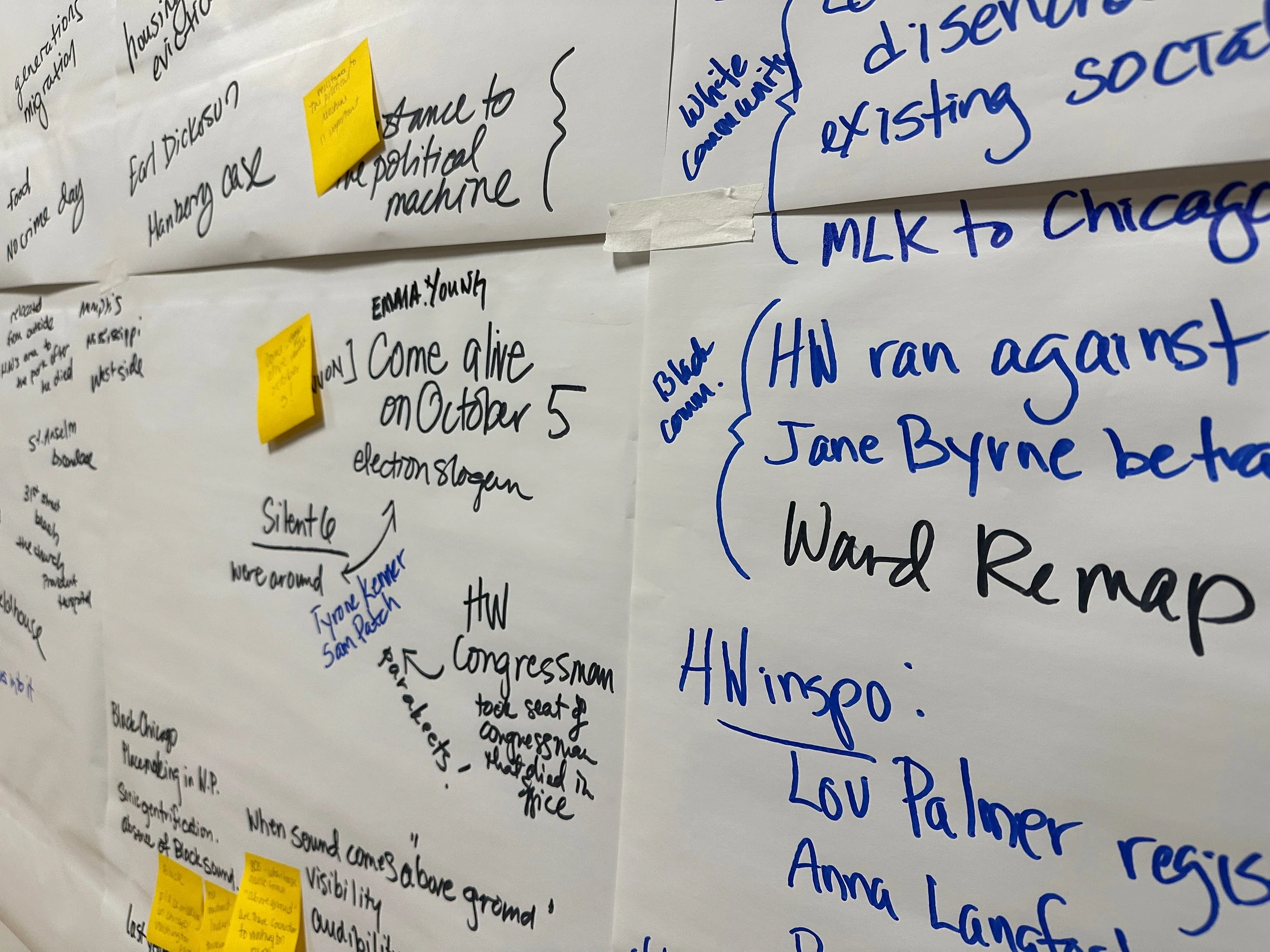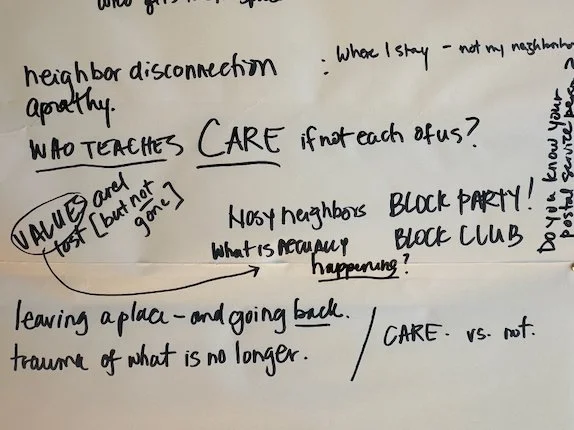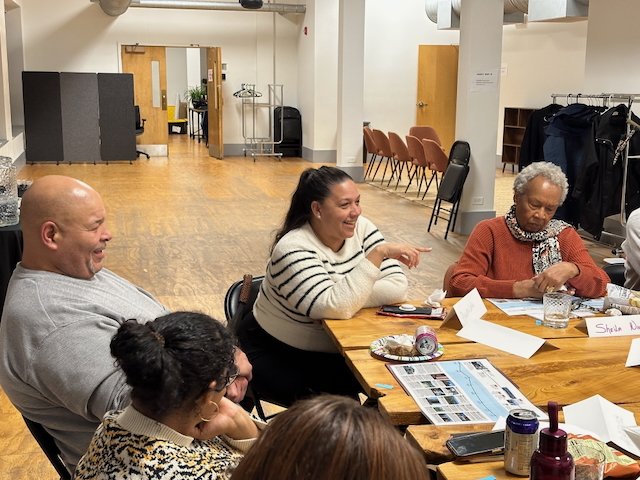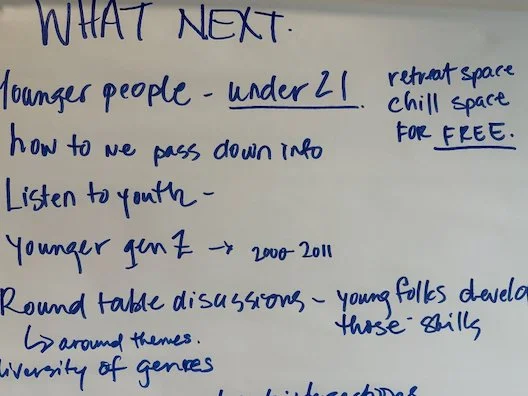
Washington Park In Our Time
Washington Park, one of Chicago’s 77 community areas, has a well-known and vibrant arts and cultural history dating from the early to mid-20th Century. Over the past decade, Arts + Public Life has celebrated the thriving contemporary art and culture of Washington Park and the South Side. But what links persisted between the Great Migration and our current time? In particular, how did art and culture endure through the decades of policies that were tumultuous for the fabrics of the Washington Park community?
During Spring 2025, the Arts + Public Life Cultural Stewardship team convened a learning and discussion group about the people and culture of the Washington Park neighborhood during the 1980s - 2000s. Washington Park In Our Time was an opportunity for memory holders of this era to convene, share, and discuss pivotal events, people, places, and/or circumstances of their generation. We aimed to recognize commonalities and differences in lived experience during the time period that precedes and deeply informs the current moment, illuminate efforts, processes, collectives, and energies that nurtured people in pursuit of cultural expression, and identify new pathways for carrying this knowledge forward.
A cohort of eight individuals, with their unique and deep ties to Washington Park, met for three evenings at the Arts Incubator and were joined by different guests for each session. Thank you to our Research Assistant, Nina Olney, a PhD candidate at the University of Chicago, for supporting the team and drafting thoughtful session summaries. We're very grateful to the cohort and guests for contributing with honesty and care, allowing us to be part of such meaningful conversations, and most importantly, for helping carry forward Washington Park’s rich history and legacy of arts and culture.
Read on to learn more!
Discussion Cohort
-
Rose Blouin (she/her) has created documentary and fine art photography since 1980. Her work has been featured in solo and group exhibitions at venues including the Museum of Science and Industry, the DuSable Museum, and the Logan Center for the Arts. Her photographs have received awards and appeared on the covers of South Side Stories, Columbia Poetry Review, and Blue Lyra Review. Her most recent solo exhibition, To Washington Park, With Love: Photographs from the Summer of 1987, was presented at Arts + Public Life’s Arts Incubator; the collection is published by Haymarket Books (2024). Blouin is a founding member of Sapphire & Crystals and a member of Black Women Photographers.
-
Harold Brown (he/him) is Lead Maintenance Engineer with Arts + Public Life, a role that reflects his deep-rooted connection to the Washington Park community. Born in 1961, he grew up at 4833 S. St. Lawrence as one of 13 children. A curious and watchful presence in the neighborhood since youth, Harold developed an entrepreneurial spirit that led him to the Arts Block in 2012. He began as a laborer during the renovation of 301 E. Garfield Blvd. and later trained as a carpenter through the project. His care for the buildings and people around him is rooted in deep his pride of place. Harold’s commitment makes him an essential part of the team and a true steward of Washington Park.
-
Peter Gaona (he/him) is a Chicago-based creative entrepreneur, arts administrator, and marketing strategist. He is the founder of ReformedSchool, a handmade wearable art brand blending fashion, education, and Black cultural history. Since 2013, ReformedSchool has created accessories that spark dialogue and pride. In 2021, Peter opened the brand’s first storefront through the L1 Creative Business Accelerator by UChicago’s Arts + Public Life. He also serves as Creative Director of Marketing at Deeply Rooted Dance Theater, shaping brand narratives that amplify the company’s mission. Peter’s career includes roles at The Chicago High School for the Arts, Columbia College’s CCAP, and AileyCamp Chicago. With a background in dance and a passion for storytelling, Peter weaves creativity, culture, and community into every project.
-
Dr. april l. graham-jackson (she/her) is a Postdoctoral Scholar in Sociology and Research Fellow with Chicago Studies, CEGU, and the Urban Theory Lab at the University of Chicago. She is also a Fellow with the American Council of Learned Societies (ACLS) and Long-Term Fellow with the Newberry Library. A third-generation Black Chicagolander, april’s work explores how Black people shape, and are shaped by, Chicagoland. Her first project examines Black suburban placemaking in the Southland; her second traces how Chicago’s Black house music community created “house geographies” to transform identity, belonging, and mobility. april earned her PhD in Geography from UC Berkeley and graduated summa cum laude from Mount Holyoke College as the first to earn a bachelor’s in Black Geographies. She reflects on her work atBlackChicagoland.com.
-
Candace Hunter (she/her) is a Chicago-based artist known for collage, painting, installation, and performance. Using found materials such as magazines, vintage maps, and cloth, she creates layered works that offer beauty, history, and new perspectives. During the COVID-19 pandemic, she launched free Instagram art classes and began her "Brown Limbed Girls" series, celebrating whimsical, joy-filled Black girlhood. A respected voice in the Midwest arts community, Candace is a recipient of the Elevate Climate Change Maker Award (2022), 3Arts Next Level Award (2021), Meier Foundation Award (2020), and 3Arts Award (2016). She has been honored by Diasporal Rhythms and has served as a juror and speaker for feminist and ecological arts organizations.
-
Roderick E. Jackson (he/him) is a second-generation Black Chicagolander and PhD student in African American Studies at UC Berkeley. His research explores Black male labor and care in Northwest Indiana’s Calumet Region, focusing on how working-class men navigate race, class, and gender in the post-industrial era. He is the principal photographer for Black Chicagoland, a multisensory project mapping Black life across the metro area through photography, sound, and community cartography. A cum laude graduate of UMass Amherst in Anthropology, Roderick is also a music producer and co-founder of the Grammy-certified duo Tensei, with collaborators including J Ivy, Bilal, and Makaya McCraven. His work redefines “Black Chicagoness” as a root, route, and practice of placemaking. More at BlackChicagoland.com.
-
Phaedra M. Leslie (she/her) is a committed advocate for equity and inclusion, with deep experience cultivating diverse, community-centered workplaces. She serves as Vice President of Diversity, Workforce Development, and Community Engagement at ALL Construction Group, where she drives business growth, leads diversity efforts, and oversees social impact initiatives. Formerly the inaugural Director of Business Relations and Economic Development at the Chicago Cook Workforce Partnership, she advanced equity-focused employment and training programs. Phaedra holds a B.A. in Mass Media Communications and English Literature, an M.A. in Organizational Management, and certifications in DEI and Project Management. She actively serves with several organizations, including NAAAHR, Chicago African Americans in Philanthropy, and Emerald South Community Economic Development Collaborative.
-
Sheila Nicholes (she/her) is a dedicated community member, artist, and advocate with a passion for photography, travel, and youth engagement. She is developing a history-focused project for young people and previously served on several committees, including the South Shore Cultural Center, Hyde Park Historical Society Oral History Committee, and Hyde Park Community Advisory Committee. She also attends meetings with the Washington Park Advisory Council and BMRC. As Program Chair of the Washington Park Camera Club, she partners with Arts + Public Life. A retired Academic Administrator from IIT’s College of Architecture, Sheila is also a Life Strategy Coach, Family Counselor, and Bronzeville tour consultant. She advocates for senior health as a SuperAger Research ambassador and facilitates ministry work on emotional wellness.

-
Politics
March 12, 2025
-
Property
April 9, 2025
-
Culture
May 14, 2025
Politics
-
Charles Russell Branham is a historian, educator, and Emmy Award–winning producer whose work centers African American history and politics. Born in Chicago in 1945, he earned his Ph.D. in history from the University of Chicago as a Ford Foundation Fellow. He has taught at numerous institutions, including UIC, Northwestern, and Indiana University Northwest, and was honored with UIC’s Silver Circle Teaching Award.
Since 1984, Branham has served in various roles at the DuSable Museum of African American History, including Director of Education and now Senior Historian. He is the author of The Transformation of Black Political Leadership in Chicago, 1865–1943 and has consulted widely on Black history curricula. His series The Black Experience was the first nationally televised program on African American history. Branham has also contributed to public policy through expert testimony that shaped Chicago’s minority business and political representation programs.
-
Salim Muwakkil is a veteran journalist, political commentator, and cultural critic based in Chicago. A former U.S. Air Force administration specialist, he earned a B.A. in political science from Rutgers University before launching a writing career that spans five decades. Muwakkil began as a news writer for the Associated Press and later became managing editor of Muhammad Speaks, then the largest Black-owned newspaper in the U.S.
Since 1984, he has served as senior editor at In These Times and contributed columns to the Chicago Sun-Times, Chicago Tribune, The New York Times, and The Washington Post. He hosts The Salim Muwakkil Show on WVON-AM and is the author of Harold!, a book on Mayor Harold Washington. A frequent media guest and former adjunct professor at Northwestern and the Art Institute of Chicago, Muwakkil is known for incisive commentary on race, politics, and social justice.
-
Emma Young is a celebrated author, advertising pioneer, and creative force whose career bridges corporate innovation and cultural storytelling. A Chicago native, she began as a research assistant with the Chicago Urban League before launching into advertising through the American Association of Advertising Agencies’ training program. She joined Leo Burnett in 1974, crafting campaigns for major brands like Procter & Gamble, Kellogg’s, and Kimberly‑Clark.
In 1980, Young founded Brainstorm Communications at Soft Sheen Products, leading influential campaigns like the voter registration drive “Come Alive, October 5,” which helped elect Harold Washington. At Burrell Advertising, she rose to VP and Group Creative Director, creating hip-hop–themed Sprite ads featuring Kurtis Blow and Kid ’n Play. Young has earned 20+ CEBA awards and written for film, children, and memoir. A cultural advocate and founder of the Black Screen Writers Association, she continues to inspire through storytelling rooted in purpose and pride.
Salim Muwakkil
“But the sense of serendipity pervaded the atmosphere of Chicago South Side during much of those Harold Washington years. By serendipity I mean that people felt like the park was named after him. Washington Park, Washington Park. And so it was not only the monk parakeets who exhibited that, they seem to deem the park as an extension of spirit.”
Emma Young
“Well, Washington Park to me was where my mother, every summer, every Sunday would have a basket of fried chicken and deviled eggs. And she would take me and my four siblings and a blanket. She'd have a blanket and we'd be at Washington Park.”
Property
-
Amanda Williams is a visual artist and trained architect whose practice explores how race shapes perceptions of space and value. Her work uses color as a powerful tool to question the inequities embedded in the built environment. Her landmark series Color(ed) Theory which involved painting abandoned South Side Chicago houses in culturally resonant hues, was named by The New York Times one of the 25 most significant works of postwar architecture.
Her ongoing project, What Black Is This You Say?, began as an Instagram response to performative allyship and has since evolved into paintings, soundworks, and a major public installation in New York. Amanda’s work has been exhibited at MoMA, MCA Chicago, the Venice Architecture Biennale, and more. A 2022 MacArthur Fellow, she serves on boards including the Terra and Graham Foundations and is a founding member of the Black Reconstruction Collective. She lives and works in Chicago.
-
Ghian Foreman is the President and CEO of the Emerald South Economic Development Collaborative, which generates community wealth and amplifies local culture through shared pride, power, and investment for Chicago's mid-South Side. Emerald South attracts and coordinates investment through community convening and collaborative partnerships that increase local ownership and prosperity.
Foreman is also the Managing Partner of the Washington Park Development Group, a real estate development firm focused on traditionally underserved urban markets. In this capacity, he has been responsible for over $50 million in investments and development. Foreman sits on several boards, including the Chicago Rehab Network, Hyde Park Art Center, and previously served as President of Chicago Police Board. Most recently Foreman joined Chicago Booth as Adjunct Assistant Professor of Strategy.
Foreman earned a BS from Florida A&M University and an MBA from the University of Chicago Booth School of Business.
Ghian Foreman
“Now I say, well, what should we build? Now everybody could say a house. And I'm like, ah, that's too easy. What else do we need over here? And when you prompt young people, they're going to say what the community needs and that's where our responsibility comes in to help them deliver those things.”
Amanda Williams
“... maybe one of them will remember, maybe one kid in the building will be like, remember when it was a hundred thousand tulips for no reason? The no reason part is almost more powerful than the thing. They can't conceive that somebody would do something without expecting something else. And so that was the power.”
Culture
-
Meida Teresa McNeal is Artistic and Managing Director of Honey Pot Performance, a collective rooted in Black feminist and Afro-diasporic traditions. Her creative work spans two decades and has been presented across the U.S. and in Trinidad. Meida holds a PhD in Performance Studies (Northwestern) and an MFA in Choreography & Dance History (Ohio State). She is a 3Arts Awardee, Field Foundation Leader for a New Chicago, Chicago Dancemakers Forum Lab Artist, and Links Hall Co-Missions Fellow.
Meida is also Senior Manager of Arts & Community Impact Investments at the Chicago Department of Cultural Affairs & Special Events, where she leads artist recovery and creative placemaking initiatives. An independent artist and scholar, she also teaches part time at the University of Chicago and Columbia College Chicago.
-
Duane Powell is a DJ, cultural curator, and educator whose work spans music, community healing, and historical preservation. In 1999, he launched SOUNDROTATION, a platform that helped shape Chicago’s underground soul scene and introduce independent artists to wider audiences. Known for his deep musical knowledge and role as a cultural steward, Duane has spoken at events like the International Soul Summit, Urban Organic, and programs hosted by UChicago Arts and the Chicago Cultural Center.
Through his Rear View Mirror Sessions, Duane presents interactive music history talks at institutions such as Stanford University, the Detroit Institute of Arts, and the Chicago Public Library. A longtime DJ and tastemaker, he’s played Boiler Room, House of Blues, MCA Chicago, and major festivals including ATL Weekender and Gospel Fest. He also curates Sunday Service, a gospel house event with Rebuild Foundation, featured at the 2023 Smithsonian Folklife Festival.
Duane Powell
“The bond was always around food, music … fashion. That's a big part of house music culture. Going out was not going to clubs, [it] was someone's home, and they had a gathering and they would dress to the nines even though they'd go into somebody's house…”
Rose Blouin
“...the kids, you watch them…they were developing their own stories, but also the insight they were gaining from speaking their truth and coming to understand what that was about, what their truth was. They didn't shy away from their emotions and their fears and their dreams and their hopes and all of that. And I think kids need that kind of outlet today.”
Candace Hunter
“...as a young person…I did the DuSable Festival, the Arts and Crafts Festival, and I always had the same space. And it became the meeting spot for the older generation to come and sit and talk about the festival and the fair. … I became the meeting place. People would literally text one another, go meet at Candace’s spot and everyone knew where I was and that's where they would come to meet one another.”
Photos by Roderick E Jackson









